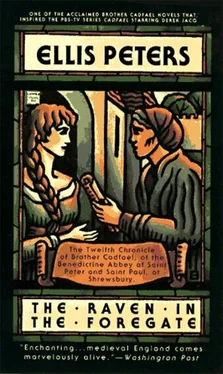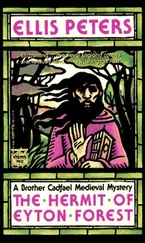“And you neither saw nor heard any other creature there? You left him whole, and alone?”
“I tell you truth,” she said, shaking her head, “I neither heard nor saw any other soul, not even when I reached the Foregate. But neither my eyes nor my ears were clear, my head so rang, and I was in such sick despair. The first I was truly aware of was blood running down my forehead, and then I was in this house, crouched on the floor by the hearth, and shivering with the cold of fear, with no notion how I got here. I ran like an animal to its den, and that was all I knew. Only I am sure I met no one on the way, because if I had I should have had to master myself, walk like a woman in her senses, even give a greeting. And when you have to, you can. No, I know nothing more after I fled from him. All night I waited in fear of his return, knowing he would not spare me, and dreading he had already done his worst against Ninian. I was sure then that we were both lost—that everything was lost.”
“But he did not come,” said Cadfael.
“No, he did not come. I bathed my head, and stanched the blood, and waited without hope, but he never came. It was no help to me. Fear of him turned about into fear for him, for what could he be doing, out in the frost all night long? Even if he had gone up to the castle and called out the guard there, still it could not have kept him so long. But he didn’t come. Think for yourself what manner of night I spent, sleepless in his house, waiting.”
“There was also, perhaps worst of all,” said Cadfael gently, “your fear that he had indeed met with Ninian at the mill after you fled, and come to grief at Ninian’s hands.”
She said, “Yes,” in a dry whisper, and shivered. “It could have been so. A boy of such spirit, challenged, accused, perhaps attacked… It could have been so. Thanks be to God, it was not so!”
“And in the morning? You could not leave it longer or leave it to others to raise an alarm. So you came to the church.”
“And told half a story,” she said with a brief, twisted smile, like a contortion of pain. “What else could I do?”
“And while we went searching for the priest, Ninian stayed with you, and told you, doubtless, how he had spent the night, knowing nothing at all of what had happened after he left the mill. As doubtless you told him the rest of your story. But neither of you could shed light on the man’s death.”
“That is true,” said Diota, “I swear it. Neither then nor now. And now what do you intend for me?”
“Why, simply that you should do what Abbot Radulfus charged you, continue here and keep this house in readiness for another priest, and trust his word that you shall not be abandoned, since the church brought you here. I must be free to make use of what I know, but it shall be done with as little harm to you as possible, and only when I have understood more than now I understand. I wish you could have helped me one more step on the road, but never mind, truth is there to be found, and there must be a way to it. There were three people, besides Ailnoth, went to the mill that night,” said Cadfael, pausing at the door. “Ninian was the first, you were the second. I wonder—I wonder!—who was the third?”
CADFAEL HAD BEEN BACK IN HIS WORKSHOP NO MORE THAN HALF AN HOUR, and the light was only just beginning to dim towards the Vesper office, when Hugh came seeking him, as he usually did if shire affairs brought him to confer with the abbot. He brought in with him a gust of moist, chill air and the quiver of a rising breeze that might bring more snow, now that the hard frost had eased, or might blow away the heavy cloud and clear the sky for the morrow.
“I’ve been with Father Abbot,” said Hugh, and sat down on the familiar bench by the wall and spread his feet appreciatively towards the brazier. “Tomorrow, I hear, you’re burying the priest. Cynric has the grave dug for him so deep you’d think he feared the man might break out of it without six feet of earth on top of him to hold him down. Well, he’s going to his funeral unavenged, for we’re no nearer knowing who killed him. You said from the first that the entire Foregate would turn blind, deaf and dumb. A man would think the whole parish had been depeopled on Christmas Eve, no one will admit to having been out of his own house but to hurry to church, and not a man of them set eyes on any other living being in the streets that night. It took a stranger to let fall even one little word of furtive comings and goings at an ungodly hour, and I place no great credence in that. And how have you been faring?”
Cadfael had been wondering the same thing in his own mind ever since leaving Diota, and could see no possibility of keeping back from Hugh what he had learned. He had not promised secrecy, only discretion, and he owed help to Hugh as surely as to the woman caught in the trap of her own devotion.
“Better, perhaps, than I deserve,” he said sombrely, and put aside the tray of tablets he had just set out to dry, and went to sit beside his friend. “If you had not come to me, Hugh, I should have had to come to you. Last night it was brought back to me what I had seen in Ailnoth’s possession that night, and had not found nor thought to look for again the next day, when we brought him back here dead. Two things, indeed, though the first I did not find myself, but got it from the little boys who went down hopefully to the pool on Christmas morning, thinking it might be frozen over. Wait a moment, I’ll bring both, and you shall hear.”
He brought them, and carried the lamp closer, to show the detail that might mean so much or so little.
“This cap the children found among the reeds of the shallows. You see how the stitches are started in the one seam, and the binding ripped loose. And this staff—this I found only this morning, almost opposite the place where we found Ailnoth.” He told that story simply and truthfully, but for omitting any mention of Ninian, though that, too, might have to come. “You see how the silver band is worn into a mere wafer from age, and crumpled at the edges, being so thin. This notch here…” He set a fingertip to the razor-sharp points. “From this I wormed out these!”
He had dabbed a tiny spot of grease into one of his clay saucers for selecting seed, and anchored the rescued hairs to the congealed fat, so that no chance draught should blow them away. In the close yellow light of the lamp they showed clearly. Cadfael drew out one of them to its full length.
“A metal edge fissured like this might pick up a stray hair almost anywhere,” said Hugh, but not with any great conviction.
“So it might, but here are five, captured at the same mis-stroke. Which makes this a different matter. Well?”
Hugh likewise laid a finger to the glistening threads and said deliberately: “A woman’s. Not young.”
“Whether you yet know it or no,” said Cadfael,”there are but two women in all this coil, and one of them is young, and will not be grey, please God, for many years yet.”
“I think,” said Hugh, eyeing him with a faint, wise smile, “you had better tell me. You were here from the beginning, I came late, and brought with me another matter warranted to confuse the first. I am not interested in preventing young Bachiler from making clean away to Gloucester to fight for his Empress, if he has nothing on his conscience that chances to be more particularly my business. But I am interested in burying the ugly fact of murder along with Ailnoth tomorrow, if by any means I can. I want the town and the Foregate going about their day’s work with a quiet mind, and the way cleared for another priest, and let’s hope one easier to live with. Now, what I make of these hairs is that they came from the head of Dame Diota Hammet. I have not even seen the woman in a good light, to know if this colouring is hers, but even there indoors the bruise on her brow was plain to be seen. She had a fall on the icy step—so I had been told, and so she told me. I think you are saying she came by that injury in a very different manner.”
Читать дальше












